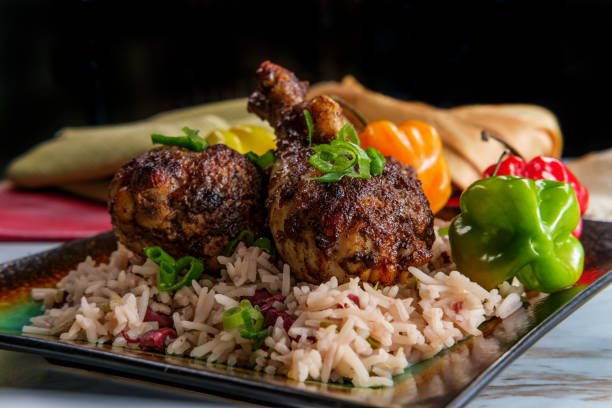Jamaican food is as rich and scented as the folks who have been making and intake recipes for many eras. A cult of spices, natural fixings, and ways of Jamaican cooking is the reflection of the interesting and flavorful culture of this country. However, when it comes to health, many wonder: Is Jamaican Food Healthy? There is a tendency for such questions to arise because of those unstandardized tastes and some methods of preparing the dish. However, in this article, we shall discuss possible health benefits, nutrients available, and the probabilities of undesirable effects of Jamaican food.

Traditional Jamaican Ingredients and Their Health Benefits
Meeting the well-balanced system of nutrition, Jamaican cuisine uses a lot of fresh and useful products. A lot of foods are grilled and focus on vegetables, herbs, and meats, especially those produced locally. Such ingredients have health qualities that they add to food which endow Jamaican food with certain nutritional values.
One of the staple foods of Jamaica cuisine is ackee, a fruit preferred in the preparation of several dishes which includes salted codfish. Ackee is rich in healthy fats, fiber, and vitamin C hence a highly recommended food but it should be noted that its raw form specifically the unfurled bud is poisonous. Another food that is common in Jamaica’s diets is salt fish usually codfish. Protein and omega-3 fatty acid supplements are required for the body and it is better to control the use of salt in the case of salted nuts.
As a complement to protein foods, Jamaican ethnic groups enjoy many vegetables and fruits including yams, plantains, cassava, and callaloo. These staples belong to products containing fiber, vitamins, and minerals to support heart health, digestion, metal, and energy. For instance, plantains are loaded with potassium and vitamin C while callaloo, a vegetable that is very close to spinach contains Iron, calcium, and vitamins A and C. Reflecting on the question, Is Jamaican Food Healthy? the presence of these nutrient-dense foods no doubt has to be considered as a big positive for the situation.
The Role of Spices in Jamaican Food and Their Health Impacts
Some herbs and zings that are used in Jamaican foods are halt bonnet shower, all spices usually referred to as pimento, thyme, and ginger. The spices not only give the food a better taste, but they also have multiple helpful effects on our health.
Scotch bonnets as used in Jamaican jerk seasonings contain high capsaicin compounds which have proven to be anti-inflammatory and increase metabolism levels. Capsaicin aids in circulation, reduces pain, and aids cardiovascular health. Like many herbs used in Jamaican teas and foods, ginger is efficiently credited with the qualities that help to prevent nausea and inflammation, and improve digestion and health in general. One of the ingredients in care, pimento or allspice, has an antioxidant factor that shields the cells from excessive aggression and may be used to modulate immunity.
Is Jamaican Food Healthy? Examining Cooking Techniques
Nevertheless, a percentage of Jamaican food contains health-improving ingredients; however, the way food is prepared makes the diet more or less healthy. Grilling, steaming, and boiling vegetables and proteins preserve the nutrient content of foods as compared to the other ways of preparing foods. For instance, jerk chicken which is one of the most popular dishes from Jamaica is usually grilled and most of the dietary fat melts downwards thereby making it a healthier protein.
Nevertheless, some Jamaican dishes contain deep fry or additional fats which can raise the amounts of calories and saturated fats. Fried dumplings tasty side dish can also be deemed as traditional Jamaican food and is a good example of food getting fried to high calories and less nutrient density. The very popular stews and rice coconut milk also fall under high saturated fats. That is why when using coconut milk then one has to ensure that more so the calorie content is not consumed in large proportions.
Is Jamaican Food Healthy? Most of it greatly depends on the chosen methods of cooking. Many Jamaican Foods can be prepared by grilling or steaming and a little less of the Types of oils used and instead of using more salty seasonings opt for natural products.
The Impact of Jamaican Food on Heart Health
This is why heart health is one of the most highly ranked factors when individuals consider their diet. The number of hard facts and evidence that make a definite conclusion clear have been found to relate to Jamaican cuisine elements that can both promote and jeopardize a healthy heart depending on the single ingredients used.
Most Jamaican dishes contain foods with high fiber, vitamins, and antioxidants that are good for the heart. For example, fiber from foods such as yam, sweet potatoes, and green bananas reduces cholesterol while a chemical compound- antioxidants which are in scotch bonnet pepper and allspice reduces heart diseases. Also, carbohydrates such as whole grain bread and pasta are preferred because instead of Hong Kong people stick to lean meats like grilled chicken or fish.
However, investigators ascertained that several foods consumed by Jamaicans are unhealthy for the heart owing to deep-frying and consistencies with high salt content. Such as saltfish – is highly salted and using this means that when not properly rinsed and cooked can lead to elevated levels of sodium. Sodium is known to cause high blood mass when busy in large sizes over some time and so high blood weight is a risk issue for heart disease. Thus, those asking, Is Jamaican Food Healthy? they must switch their sodium intake and eat foods that are good for their hearts.

Protein and Energy in Jamaican Dishes
Jamaican food provides enough protein foods that assist in the construction and repair of tissues, the growth of muscles, and sustaining energy levels. Protein-containing foods include chicken and fish and some vegetable protein like beans and lentils which are usually prepared in stews and soups.
Rice and peas are a Jamaican specialty that includes red kidney beans; it is rich in protein as well as carbohydrates thereby providing sustaining energy. When eaten alongside vegetables, rice, and peas is a balanced meal that supplies several vitamins and minerals. For those asking if Is Jamaican Food Healthy, the answer more frequently than not, can be found in the constancy of balanced courses such as rice and peas where one gains sustaining energy with no bad cholesterol or high fructose sugars included.
Conclusion
Finally, the question Is Jamaican Food Healthy? Arises depend on which dishes have been selected and how these have been cooked. Jamaican food contains unadulterated, natural foods such as fruits and vegetables, lean meats, and disease-fighting spices. These components favor heart health, give vitamins required for the body, and aid in digestion making Jamaican food potentially healthy.
However, like most cuisines, the health benefits can come into question when nutritionally undesirable techniques such as deep frying, or the use of excessive salt and saturated fats are employed. Methods of preparation excluding frying, skinning, and deep frying, choosing foods that are grilled or steamed, and giving plant products a dominant place are some ways to make Jamaican food very much in agreement with healthy eating.
FAQs
Q1: Can Jamaican food fit into a heart-healthy diet?
Ans: Indeed some Jamaican dishes can have positive impacts on heart health. Such a product range includes fresh vegetables, fruits and leguminous crops, lean meats, and much more to support heart’s health. Be careful with high sodium foods such as saltfish, and also avoid taking foods fried in oil as they are loaded with extra fats. Grilled meals should be made beforehand and the inclusion of more plant products in the Jamaican diet can assist a lot in preventing heart problems.
Q2. Does Jamaican food contain a lot of sodium?
Ans: Vulnerable traditional Jamaican foods include foods that were prepared using salted meats which tend to have very high sodium content. However, marinating, sautéing or boiling, roasting or baking, grilling, and stir-frying many food items are common and they are spiced rather than salted. If you are unsaturated on salt you can opt for foods that do not include highly salted additions and ask to minimize salt when eating out.



